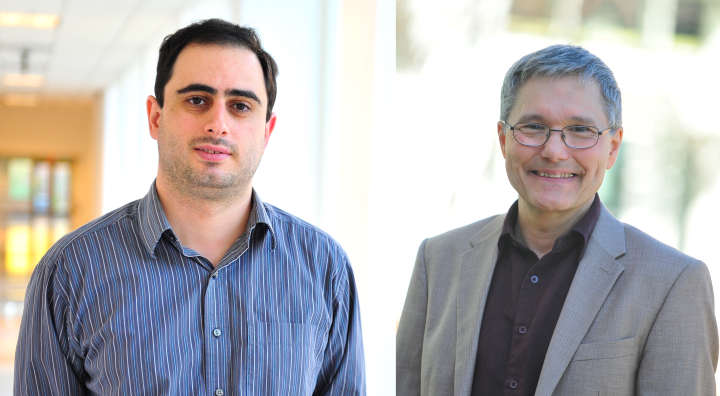Two Faculty Members Named Fellows of the American Association for the Advancement of Science
Two professors in the department of Computer Science were named 2022 Fellows of the American Association for the Advancement of Science (AAAS):
-
Mohammad Hajiaghayi
-
Dana Nau
“I join the CMNS community in congratulating Professors Hajiaghayi and Nau on their well-deserved election as AAAS Fellows,” said CMNS Dean Amitabh Varshney. “This is an affirmation of what we already know—that they are each pushing the boundaries in their respective fields and making a significant impact on the grand challenges our society faces today.”
UMD’s 2022 Fellows, seven in total, join a class of 506 new Fellows who have moved their fields forward, paving the way for scientific advances that benefit society. They bring diverse and novelty thinking, innovative approaches and passion that will help solve the world’s most complex problems, according to AAAS’s announcement.
“AAAS is proud to elevate these standout individuals and recognize the many ways in which they’ve advanced scientific excellence, tackled complex societal challenges and pushed boundaries that will reap benefits for years to come,” Sudip S. Parikh, AAAS chief executive officer and executive publisher of the Science family of journals, said in an announcement.
Mohammad Hajiaghayi
Mohammad Hajiaghayi, who holds the Jack and Rita G. Minker Professor of Computer Science, is a professor in the Department of Computer Science with a joint appointment in the Institute for Advanced Computer Studies. He has made significant contributions to the fields of algorithmic graph theory and algorithmic game theory.
His research and scholarship involve algorithmic game theory and combinatorial auctions, network design, combinatorial optimizations and approximation algorithms, fixed-parameter algorithms, algorithmic graph theory, distributed and mobile computing, machine learning, and computational geometry and embeddings. He has 350 refereed technical publications.
Hajiaghayi is a Guggenheim Fellow, an IEEE Fellow, an Association for Computing Machinery (ACM) Fellow, a European Association for Theoretical Computer Science Fellow and a Blavatnik Honoree. He received a University of Waterloo Alumni Achievement Medal, an Office of Naval Research Young Investigator Award, as well as a National Science Foundation CAREER Award. He was also an Amazon Scholar, a visiting research scientist at Google AI-Research and a visiting researcher at Microsoft Research. He is editor-in-chief of Algorithmica, the oldest and leading journal dedicated to algorithms, and his comprehensive book “Computational Intractability: A Guide to Algorithmic Lower Bounds’’ (MIT Press), co-authored with MIT Professor Erik Demaine and UMD Computer Sciene Professor William Gasarch, is now available at hardness.mit.edu.
Before joining UMD, Hajiaghayi was a senior researcher in the Algorithms and Theoretical Computer Science group at AT&T Labs. Prior to that, he was a one-year postdoctoral fellow in the School of Computer Science at Carnegie Mellon University and a one-year postdoctoral associate at the MIT Computer Science and Artificial Intelligence Laboratory. He received his doctorate in applied mathematics at MIT in 2005, his Master of Science degree in computer science from the University of Waterloo in 2001 and his undergraduate degree in computer engineering from Sharif University of Technology in 2000.
Dana Nau
Dana Nau is a professor in the Department of Computer Science with a joint appointment in the Institute for Systems Research who conducts research in artificial intelligence (AI), with a focus on automated planning and game theory.
He discovered pathological game trees, in which looking farther ahead produces worse decision-making, and co-authored the AI planning and game-tree search algorithm used to win the 1997 world championship of computer bridge. In collaboration with social psychologists, he uses evolutionary game theory to study the evolution of human behavioral norms such as cooperation and punishment and ethnocentrism. He also led the development of the AI planning systems SHOP, SHOP2, Pyhop and GTPyhop, which have been used in thousands of projects worldwide.
Nau is currently the lead investigator on the Learning Online Temporal Goal Networks project and a member of several other research projects including the MURI: Innovations in Mean-Field Game Theory for Scalable Computation and Diverse Applications.
He has nearly 400 refereed technical publications and has co-authored two graduate-level textbooks: Automated Planning: Theory and Practice (2004), the de facto standard textbook on AI planning, and Automated Planning and Acting (2016).
Nau is a Fellow of the Association for the Advancement of Artificial Intelligence and the Association for Computing Machinery. He received a B.S. in applied mathematics from Missouri S&T (then called the University of Missouri-Rolla) in 1974 and a Ph.D. in computer science from Duke University in 1979 before joining the UMD faculty.
The article is republished from the CMNS website.
The Department welcomes comments, suggestions and corrections. Send email to editor [-at-] cs [dot] umd [dot] edu.
